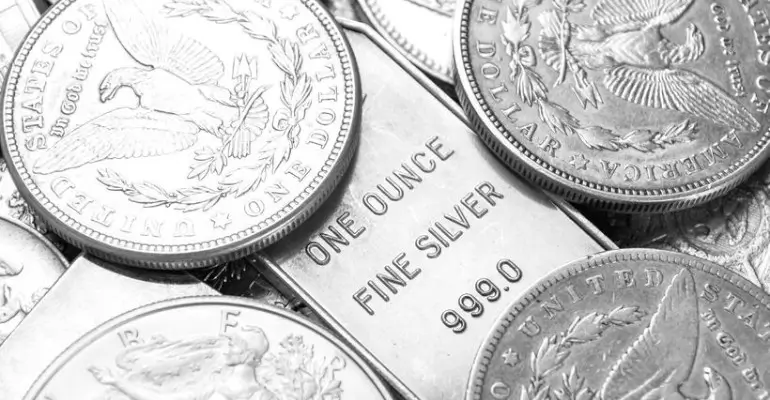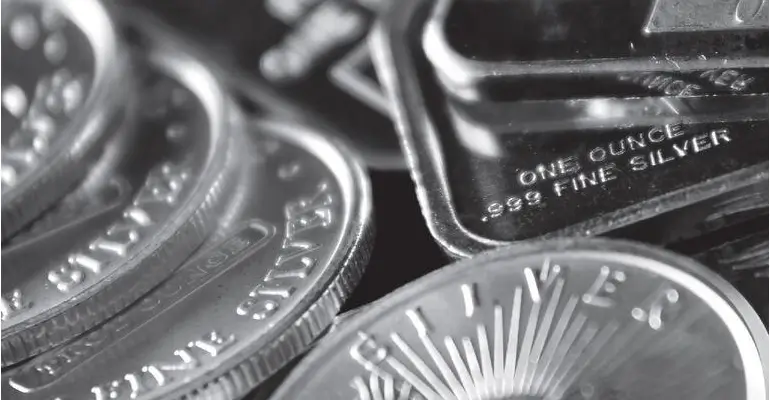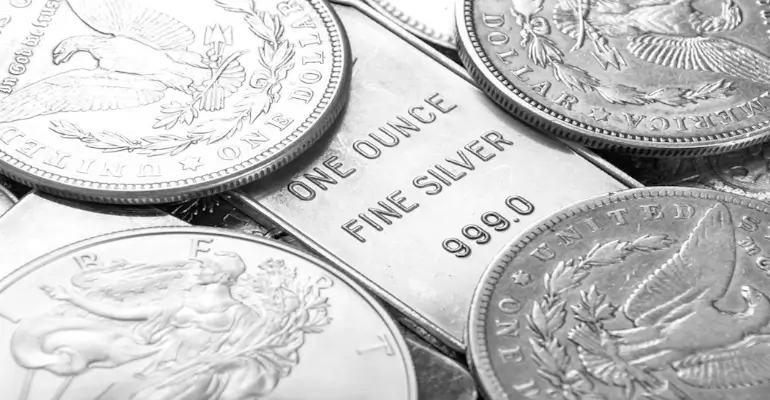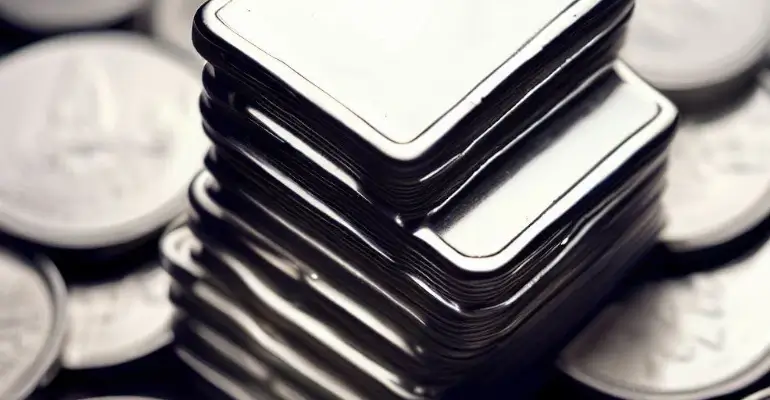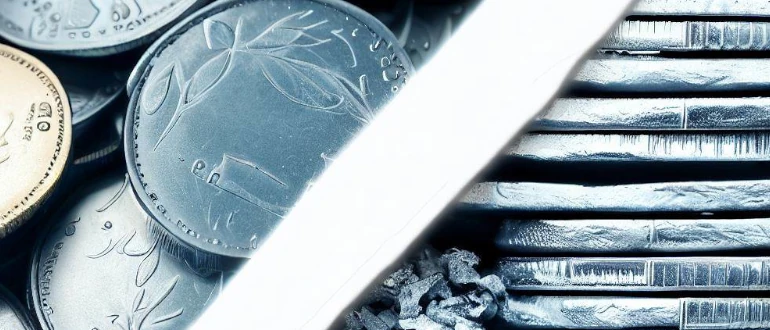Silver Bullion: Buying Silver, Types to Buy, Purchase Silver Online

Investing in silver bullion offers a reliable method for safeguarding wealth, particularly during periods of economic uncertainty and inflation. Silver, a precious metal, has historically maintained its value, serving as a hedge against financial instability. When considering silver bullion, there are various types available, each with its unique features. These include silver coins, bars, and rounds, differing in size, purity, and premiums over the spot price. This article will also guide you through the process of purchasing silver online, from selecting reputable dealers to understanding the intricacies of online transactions, including shipping, insurance, and secure payment methods.
Silver Coins
Silver coins are a popular choice among investors and collectors. Renowned examples include the American Silver Eagles, Canadian Maple Leafs, and Austrian Philharmonics. These coins typically boast a high purity level of .999 silver and come in various weights, from 1 ounce to several kilograms. Their legal tender status in their respective countries adds to their appeal. Silver coins also possess a collectible aspect, with some being part of limited edition series or commemorative issues, potentially increasing in numismatic value over time. The premium over the spot price of silver coins varies, influenced by factors such as rarity, demand, and condition.
Silver Bars
Silver bars are available in a wide range of sizes, from 1 ounce to massive 1,000-ounce bars. The most commonly traded sizes are 10 and 100 ounces. Generally, larger bars carry lower premiums over the spot price, making them a cost-effective investment option. There are two primary types of silver bars: cast bars, which are poured into molds and often have a rustic look, and minted bars, which are cut from flat silver sheets and typically feature more intricate designs. Hallmarking and serial numbers are crucial for authenticity and traceability, especially for bars from reputable mints like the Royal Canadian Mint or Johnson Matthey.
Silver Rounds
Silver rounds resemble coins but are not legal tender. Often produced by private mints, they come in common designs, including historic coin replicas and thematic images. The typical weight for silver rounds is 1 ounce, and they are composed of .999 fine silver. Rounds generally have lower premiums compared to silver coins, making them an attractive option for investors more interested in the silver content than collectible value.
Silver IRAs
Silver Individual Retirement Accounts (IRAs) offer a unique way to incorporate physical silver into retirement planning. These self-directed IRAs require silver to meet certain IRS standards, such as a minimum fineness of .999 and storage in an approved depository. Eligible silver products for Silver IRAs include specific coins and bars approved by the IRS.
Rollover Silver Into IRA
Rolling over existing retirement funds into a Silver IRA involves specific eligibility criteria, like having a 401(k) from a former employer or an existing traditional IRA. It's essential to understand the tax implications and potential penalties for early withdrawal. The process requires careful documentation and adherence to a stipulated timeframe to ensure a seamless asset transfer. Consulting with a financial advisor is recommended to navigate these aspects effectively.
Where to Invest in Silver Bullion
Investing in silver bullion can be done through various platforms, such as online precious metals dealers, physical retail stores, and commodities exchanges. When choosing a platform, it's crucial to research the dealer's credibility, customer reviews, industry accreditation, and pricing transparency. Factors like storage options, shipping costs, insurance, and buyback policies should also be considered.
Buy Silver From Reputable Dealers
Purchasing silver from reputable dealers, who are members of recognized industry associations like the Professional Numismatists Guild (PNG) or the American Numismatic Association (ANA), is vital. Investigate the dealer's track record, customer feedback, and policies on authenticity, returns, and buybacks. Authenticity verification is crucial, which includes checking for hallmarks, weight, purity stamps, and using testing tools like acid tests or electronic testers.
Invest Silver in IRA
For investing silver in an IRA, it's important to focus on IRS-approved silver bullion coins and bars with a purity of .999 or higher. Setting up a Silver IRA involves choosing a custodian, opening an account, funding it, and selecting the silver investments. Storing IRA silver in an IRS-approved depository is mandatory, and there are annual fees associated with IRA accounts and storage.
Purchase Silver Directly From Mints
Buying silver directly from silver mints offers the assurance of authenticity, direct pricing, and access to the latest releases and limited editions. Major mints where individuals can purchase silver include the U.S. Mint, the Royal Canadian Mint, and the Perth Mint. However, there may be limitations like minimum purchase requirements and potentially higher premiums compared to secondary markets.
Cheapest Places to Buy Silver
When searching for the most affordable places to buy silver, several options emerge. Online dealers often offer lower premiums due to their high volume of business. Coin shows and local coin shops might present opportunities to find silver at underpriced rates. However, buyers should be cautious of counterfeit products in less reputable marketplaces. It's essential to conduct thorough due diligence before making a purchase.
Benefits to Investing in Silver
Affordability
Silver is more accessible to a broader range of investors due to its lower price per ounce compared to other precious metals like gold, platinum, or palladium.
Industrial Demand
Silver's extensive use in various industries, including electronics, solar energy, and medical applications, underpins its demand and potential price stability.
Hedge Against Inflation and Economic Uncertainty
Silver serves as a safe-haven asset, preserving wealth during times of inflation and economic uncertainty.
Potential for High Returns
Due to its historical price volatility, silver can offer opportunities for higher returns compared to other precious metals.
Best Types of Silver to Invest In
Investors have various options when it comes to the best type of silver, including bullion coins, bars, rounds, and junk silver. Each type has its own pros and cons, and factors like liquidity, storage, and premium over spot price should be considered. Collectible and rare silver coins might represent a high-value investment due to their numismatic value, which can appreciate independently of the silver market.
Storage Options For Silver Investments
Common storage options include home safes, safety deposit boxes at banks, and third-party secure storage facilities. For home storage, the importance of insurance and security cannot be overstressed. Third-party storage offers benefits like segregation and auditing. Investors can choose between allocated and unallocated storage in vaults, each with distinct ownership, risk, and cost implications.
How the Price of Silver is Impacted
The price of silver is influenced by a variety of factors, including supply and demand dynamics, its industrial and technological uses, and investment demand. Macroeconomic indicators like interest rates, currency values, and economic growth or recession also play a role. Additionally, market speculation, including futures trading and ETFs, contributes to the volatility and price trends of silver.
Geopolitical Events vs Silver Value
Geopolitical tensions, wars, and uncertainties can significantly affect silver prices. As a safe-haven asset, silver often sees increased demand during such times, reflecting its stability and reliability in uncertain environments.
Government Policies Impact on Prices
Government policies, including monetary policy, trade tariffs, and mining regulations, can influence silver's supply and demand dynamics. These policies can affect the availability and price of silver on the global market.
Central Banks Impact on Silver
Central banks influence silver prices through their monetary policies, reserve holdings, and market interventions. Their actions can have significant implications for the silver market.
How Inflation Impacts Silver Prices
Silver prices often appreciate during high inflation periods, as investors seek tangible assets. This relationship between inflation rates and silver prices highlights silver's role as a valuable investment in times of economic fluctuation.
Will the Price of Silver Go Up?
Analyzing historical trends and market cycles offers insights into potential future movements of silver prices. Factors like growing industrial demand, investment demand during economic uncertainties, and supply constraints could lead to price increases. However, predicting market movements with certainty is challenging. Investors are advised to focus on diversification and long-term strategies rather than attempting to time the market.
Silver's Historical Performance
Silver's price history features significant peaks and troughs over the past decades. When compared to other commodities and asset classes, silver's performance in terms of returns and volatility is noteworthy. Its role in various economic scenarios, such as recessions, inflationary periods, and market booms, is also significant, providing insight into its behavior under different economic conditions.
Physical Silver vs Paper Silver
Owning physical silver, like coins, bars, and rounds, offers tangible assets and direct ownership. In contrast, paper silver, including ETFs, futures, and certificates, provides convenience and ease of trading. Physical silver involves risks like storage and insurance, while paper silver carries counterparty risk. Paper silver allows for easier diversification and liquidity, whereas physical silver is often preferred for long-term holding and as a hedge against systemic financial risks.
Investing in Non-Physical Silver
Non-physical or 'paper' silver investments include Silver Exchange Traded Funds (ETFs), silver futures contracts, silver mining stocks, and silver streaming companies. These options offer exposure to silver prices without the need for physical storage.
Silver ETFs
Silver ETFs like iShares Silver Trust (SLV) offer a convenient way to invest in silver, mirroring the metal's price movements without the need for physical storage.
Silver Mining Stocks
Investing in silver mining stocks can provide leverage to silver prices and is influenced by factors like company performance and sector trends.
Silver Futures
Futures contracts offer speculation or hedging opportunities in the silver market but involve significant leverage and risk.
Silver Certificates
Silver certificates represent a claim on a specified amount of silver, allowing ownership without physical possession, typically issued by banks or financial institutions.
Including Silver in Your Retirement Plan
Including silver in retirement portfolios offers diversification and protection against inflation. Silver can be included in various retirement accounts like traditional and Roth IRAs, subject to specific rules regarding purity and storage. The tax implications of silver investments in these accounts should be considered, and professional financial advice is recommended.
Tax Considerations in Silver Investing
Investments in silver are subject to capital gains tax upon sale. The collectibles tax rate may apply to certain types of silver. Holding silver in an IRA may lead to deferred or tax-free growth, depending on the IRA type. Accurate tax reporting necessitates careful record-keeping of all silver transactions.
Silver vs Gold, Platinum, Palladium
Silver is compared with other precious metals in terms of price volatility, market liquidity, industrial uses, and investment characteristics. Historical price ratios between silver and these metals can indicate market trends. Silver's higher industrial demand and lower price point make it more accessible to a wider range of investors.
Silver vs Other Investment Options
Silver investment is compared with stocks, bonds, real estate, and cryptocurrencies in terms of risk, return, liquidity, and market dynamics. Silver offers diversification benefits, often performing differently from other asset classes during economic downturns or high inflation periods. It plays a role in a balanced investment strategy, considering factors like investment horizon, risk tolerance, and financial goals.
Silver vs Stocks
The performance and risk profiles of silver investments are compared with those of the stock market. Silver's non-correlation with traditional financial markets is a key consideration for investors seeking diversification.
Is Silver an Investment Bubble?
Analyzing historical data and expert opinions helps assess whether silver's price movements exhibit characteristics of an investment bubble. The role of investor behavior and speculative trading in influencing market perception is crucial in understanding the dynamics of silver prices.
Silver's Value If Economy Collapses
In scenarios of major economic collapse, silver's role as a store of value is explored. Its performance compared to fiat currencies and other assets in extreme situations like hyperinflation or financial crises is considered, emphasizing its potential as a tangible asset retaining intrinsic value in times of economic uncertainty.
Potential Disadvantages of Silver
The volatility of silver prices can affect investment returns, especially short-term. Storage and insurance costs for physical silver can be substantial, particularly for large investments. Liquidity issues may arise when selling large quantities of silver quickly, and market conditions can impact the ease of liquidation.
Purchasing Silver in Bulk Quantities
Buying silver in bulk can offer advantages like lower premiums and efficient storage. The logistics of purchasing, transporting, securing, and insuring large silver quantities are discussed, along with the best sources for bulk purchases, including direct purchases from mints, large dealers, or wholesale markets.
Warren Buffett's Silver Investing
In the late 1990s, Warren Buffett, through Berkshire Hathaway, made a significant foray into silver investing by purchasing 130 million ounces. This strategic move was based on his assessment of the silver market at the time, including its undervaluation compared to other assets, potential industrial demand, and the overall dynamics of precious metals. Warren Buffett's silver investment had a notable impact on the silver market. However, his later decision to sell off the silver and shift his views on silver as an investment class offers valuable lessons in navigating the volatile commodity markets. It highlights the importance of adapting investment strategies in response to changing market conditions and perceptions.
Silver Bullion vs Junk Silver as Investments
Comparing silver bullion and junk silver reveals distinct investment characteristics. Silver bullion, including coins, bars, and rounds, is known for its high purity, consistent market value, and ease of valuation. It's widely recognized and appealing for both investment and collection. On the other hand, junk silver, primarily pre-1965 U.S. coins with 90% silver content, offers lower premiums over spot price, historical significance, and potential collectible value. It's a cost-effective entry point for small-scale investors and useful in barter scenarios.
Discover How to Effortlessly Rollover Silver Into Your IRA
Our free eBook covers everything you need to know before you start diverisfying your retirement with silver.
Disclaimer: Content on this website is not intended to be used as financial advice. It is not to be used as a recommendation to buy, sell, or trade an asset that requires a licensed broker. Consult a financial advisor.



